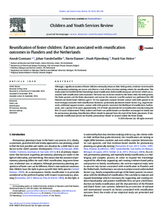Abstract
Students from foster care are highly known for their poor performance in school and retention in grade. Nevertheless, female students in general achieve better academic results than male students. Studies on gendered differences among foster children seem to be scarce. Therefore, this study examines the use of linguistics features among male and female foster children in expressing their needs to improve their academic performance. For this purpose, semi-structured interview questions are used to gather data from foster children in Malaysia. The narratives elicited from the interviews are qualitatively analysed using content analysis approach. The data reveal that the use of adjectives, direct statements and accusation are common in the responses of both male and female foster children. However, the female foster children are more expressive in their responses as intensifying adverbs were frequently used when highlighting concern on their poor academic performance. Female foster children’s willingness to share problems and concern about their academic performance makes it easier for the teachers to assist. The male foster children, in contrast, tend to use denial as a strategy to conceal their problems and avoid displaying any signs of weaknesses. Ultimately, not voicing their problems may result in the lack of awareness amongst teachers and making it challenging for them to attend to the academic needs of these children.

